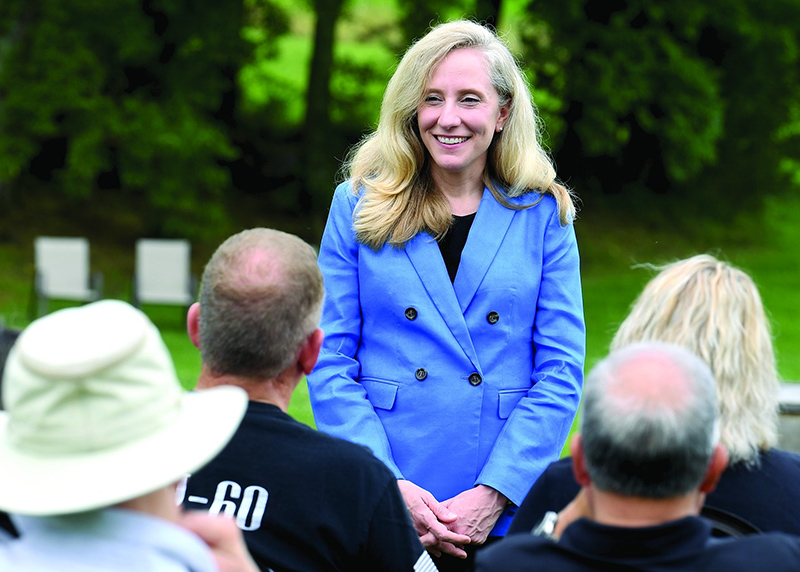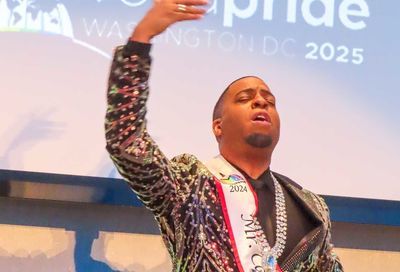An August Race in Arlington
Streetcar, Medicaid expansion dominate debate for a House of Delegates seat in D.C.’s suburbs

The two candidates running in a special election to fill a vacant seat in the Virginia House of Delegates sparred in a debate held at George Mason University’s Arlington campus Monday night.
Republican Dave Foster and Democrat Richard “Rip” Sullivan, who are both seeking the 48th District House seat left vacant after Del. Bob Brink (D-Arlington, Fairfax counties) resigned on June 30 to accept a position as Deputy Commissioner for Aging Services under current Gov. Terry McAullife (D), will face off in the special election on Tuesday, Aug. 19. At Monday’s debate, the two hammered each other on two major issues of contention: one, more local, related to a referendum aimed at stopping construction of a proposed streetcar line along Columbia Pike that would link South Arlington to Crystal City; and the other, a state and national issue dealing with the expansion of Medicaid to provide health insurance coverage for low-income people in Virginia under the Affordable Care Act.
The 48th House District runs from Crystal City up the Potomac River and through a swath of tonier neighborhoods in North Arlington before heading into McLean to take in several Democratic-leaning precincts that were removed from the 34th District in order to shore up Del. Barbara Comstock (R-Fairfax, Loudoun counties), who has since used her position to launch a campaign for the open 10th Congressional District seat later this November.
Republicans and opponents of the streetcar project, who decry the fact that its price tag has risen even before construction has started, have rallied around Foster, who has previously served on the Virginia Board of Education after twice being elected countywide to serve on the Arlington School Board, an impressive feat for a Republican in Democratic-leaning Arlington. Republicans hope to capitalize on a wave of anti-streetcar sentiment, which was demonstrated by the victory of John Vihstadt, a Republican-turned-independent and fierce opponent of the streetcar project, in an April special election to the Arlington County Board, to propel Foster to victory.
Despite the fact that the most controversial part of the streetcar project — the route along Columbia Pike — isn’t even in the 48th District, both candidates have expressed support for a bill in the General Assembly that would enable the county to call for a referendum on the project, though Foster would prefer to make such a referendum binding.
Sullivan, meanwhile, says he is “unequivocal” in his support for expanding Medicaid, an important part of the implementation of the Affordable Care Act, and has accused Foster of hedging on his commitment to expanding the program for low-income Virginia residents.
While Foster has said he wants to “reform and expand Medicaid,” with emphasis on the reform of the program, he has shied away from a full-throated embrace of expansion, saying he is best placed, as a Republican, to “initiate more discussion” around the issue of expansion, but also warning that without Medicaid reform, Virginia could run the risk of having to funnel money to health care and away from other priorities like education and public transit, two other issues important to inside-the-Beltway communities.
The audience at the debate was split almost evenly between Foster and Sullivan supporters, with about 70 percent of the audience clapping for both candidates’ statements while the remaining third of the audience sat silent after their least preferred candidate had finished speaking.
Besides the two primary issues that dominated the debate, the candidates both backed the idea of nonpartisan redistricting, but largely avoided any social issues, with the exception of marijuana (Foster supports medicinal marijuana only, Sullivan supports decriminalization). But Foster, after answering, also added that he was going down to Richmond to “solve some of the top priorities, not any of these side issues, at the outset.”
Because they avoided LGBT issues, and the moderator did not broach the topic, Metro Weekly went digging for answers on the issues of marriage equality and the prohibition on second-parent adoption for same-sex couples. The latter issue has been highlighted by the LGBT rights organization Equality Virginia in a blog series focusing on the struggles of same-sex couples with families, some of whom have been forced to take up temporary residence or travel long distances to the District of Columbia to ensure they are granted parental rights that are denied to them in Virginia.
Metro Weekly was unable to get the candidates speak on the record pertaining to a proposed bill to prohibit discrimination against LGBT people in state employment.
Both candidates appear to believe that the issue of marriage in Virginia will be settled by an overturn of the existing ban on same-sex marriage by the courts. Foster said he would be favorably inclined lifting the prohibition on second-parent adoption.
“Assuming the ban does not survive, either because of the courts or legislative action, I would want to study it, but it would seem to make sense to make that uniform,” he said.
As to whether he would support an effort to remove the discriminatory language from the Virginia constitution, even if the ban is made null and void by the courts, Foster replied, “I’m a lawyer. I’m going to let the court cases run first. That’s my instinct on that.”
Sullivan was full-throated on his support for marriage equality and full adoption rights for same-sex couples.
“First and foremost, I am absolutely in favor of marriage equality, hoping very much that the Supreme Court does the right thing,” he told Metro Weekly after the debate. “I was thrilled by what the Fourth Circuit did, and hope that we are very much on the verge of getting Virginia into the 21st century.” He also said he would be in favor of removing the marriage ban’s discriminatory language from the state constitution, although he pointed out that amending the constitution is a much more difficult and cumbersome process that could take years to resolve.
“In terms of second-parent adoption, I’m absolutely in favor of that,” Sullivan continued. “I don’t know what the bill would look like that I would write, but I would be looking, trying to advance that in whatever way I could.”
Support Metro Weekly’s Journalism
These are challenging times for news organizations. And yet it’s crucial we stay active and provide vital resources and information to both our local readers and the world. So won’t you please take a moment and consider supporting Metro Weekly with a membership? For as little as $5 a month, you can help ensure Metro Weekly magazine and MetroWeekly.com remain free, viable resources as we provide the best, most diverse, culturally-resonant LGBTQ coverage in both the D.C. region and around the world. Memberships come with exclusive perks and discounts, your own personal digital delivery of each week’s magazine (and an archive), access to our Member's Lounge when it launches this fall, and exclusive members-only items like Metro Weekly Membership Mugs and Tote Bags! Check out all our membership levels here and please join us today!






















You must be logged in to post a comment.